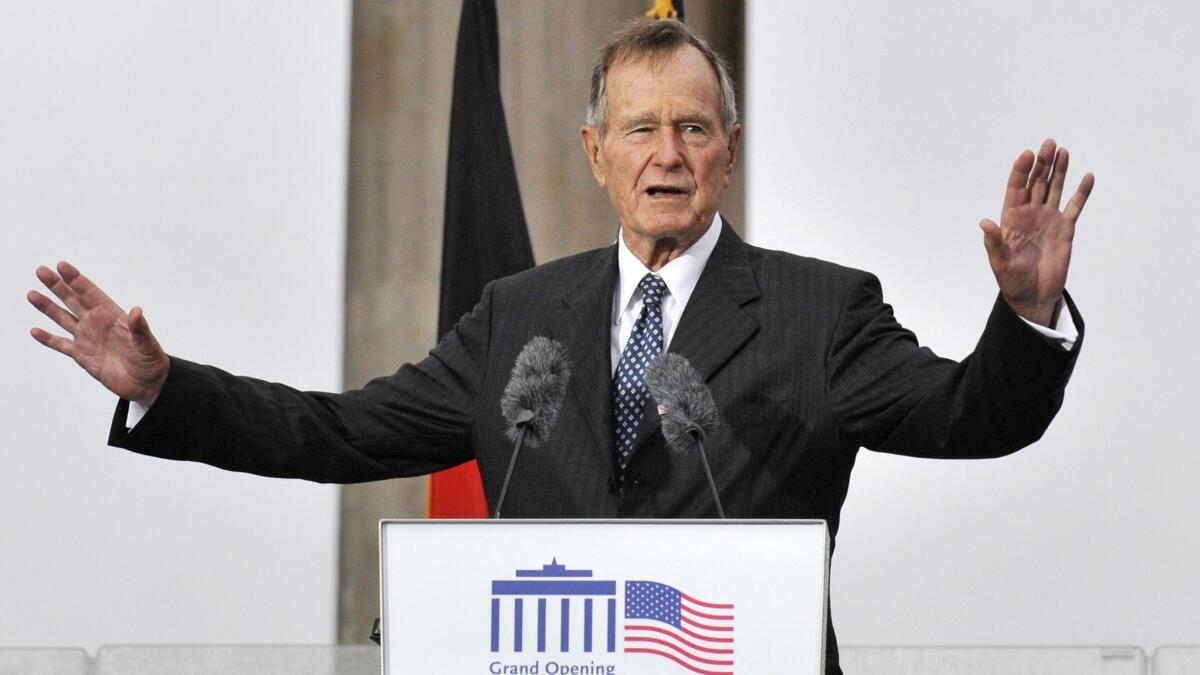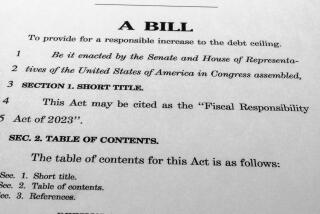Op-Ed: George H.W. Bush taught American politics an unfortunate lesson — restraint is for losers

George H.W. Bush, who lived a long life of public service, embodied a lost virtue in American politics: the idea of restraint. He was a man of modest goals whose often-ridiculed lodestar was prudence, the determination not to make things worse.
Moderation was part of his appeal, and it helped the former congressman, diplomat, CIA director and Reagan vice president to win the presidential election of 1988. But it was also clearly one of his flaws, and in 1992, it pushed him toward defeat.
The lesson to most of his successors, including his own son, was unfortunate: Restraint and moderation are for losers.
As soon as news broke Friday of Bush’s death, he began to be eulogized for his patrician, almost quaint manners; his reluctance to talk about himself (he is the only modern president who didn’t write a post-White House memoir); his personal courtesy to opponents; his blizzards of thank-you notes. (He would have been lost as president in the age of Twitter wars.) But his devotion to restraint went well beyond manners.
It was as if Bush considered campaigns as warfare, but genuine bipartisan compromise as essential to getting anything done.
Bush was a conservative but never a zealot. “I’m not a nut about it,” he said in a 1984 television interview. The remark didn’t endear him to the Republican Party’s true believers, who understood correctly that he was talking about them.
“There’s something terrible about those who carry it” — conservatism — “to extremes. They’re scary,” he wrote in his diary in 1988, in a passage cited by his biographer, Jon Meacham. “They will destroy this party if they’re permitted to take over.”
His domestic policies were the opposite of revolutionary. “I want a kinder, gentler nation,” he said when he won the 1988 Republican presidential nomination, a goal that sounds impossibly naive today.
His willingness to negotiate in reasonably good faith with the opposition allowed him to pass more bipartisan legislation than is often remembered, including the Americans With Disabilities Act and an important updating of the Clean Air Act.The recent federal report warning that climate change will damage the economy was a product of legislation Bush helped pass.
Bush’s most famous bipartisan compromise, of course, was one that got him into trouble: the 1990 budget deal in which he agreed to raise taxes to help shrink the federal deficit, a betrayal of his “read my lips” campaign promise. Hard-liners on the right considered it treachery. Newt Gingrich, then a junior member of the House from Georgia, led a congressional rebellion against the deal made by his own party’s president — a foretaste of future polarization.
Foreign policy was Bush’s greatest love, and the arena where restraint — prudence — delivered the best results.
When the Berlin Wall fell in 1989, Bush refused his political aides’ urgings that he celebrate the event, much less declare U.S. victory in the Cold War. “I’m not going to dance on the wall,” he told them.
To Bush, it was far more important that the loser in the struggle, Soviet leader Mikhail S. Gorbachev, emerge with his dignity intact and work with the United States to make the outcome peaceful.
The collapse of communist governments in Eastern Europe could easily have touched off chaos and wars. Thanks in great part to Bush, it was mostly peaceful — a genuinely historic achievement.
Bush went to war with Iraq after Saddam Hussein’s army pushed its way into Kuwait in 1991. When U.S. troops routed the Iraqi army, hawks in Washington urged Bush to keep the fight going, to march on to Baghdad and overthrow the dictator. He refused.
Two decades later, his son President George W. Bush, tried the opposite approach. The younger Bush not only toppled Saddam, but he declared that he would also make Iraq a democratic model for the rest of the Arab world. That experiment in unrestraint did not end well.
The elder Bush was not mild in all things. In political campaigns, while polite on the surface, he authorized savage attacks on his opponents, most memorably the “Willie Horton” commercial that accused Democratic candidate Michael Dukakis of letting a black criminal run free.
But he didn’t govern savagely. It was as if Bush considered campaigns as warfare, but genuine bipartisan compromise as essential to getting anything done.
In 1992, when he ran for reelection, restraint turned into a handicap. His agreement to raise taxes, even in the face of rising deficits, enraged the GOP base, leading some right-wing voters to stay home or defect to independent candidate Ross Perot. Then, as the economy slid into a recession, Bush insisted that a federal stimulus plan would be imprudent, and barely even engaged in symbolic measures to help struggling families. His Democratic opponent, Bill (“I feel your pain”) Clinton, painted him as a plutocrat who didn’t care about ordinary people.
Enter the Fray: First takes on the news of the minute from L.A. Times Opinion »
The takeaway among Republicans and some Democrats was that moderation — deliberation rather than unbridled action, fewer public words and more private conciliation — was for chumps. Moderation’s cousin, bipartisan compromise — on taxes, for example — was political suicide: Don’t ever risk losing the support of your party’s ideological base.
A few years ago, the younger Bush praised his father as “one of the greatest one-term presidents in the nation’s history.” He meant it as a compliment; he was defending his father as a man whose achievements had been undervalued.
But it’s hard not to notice the fatal qualifier: “one-term.” If only George H.W. Bush had been a better politician in 1992, he might not have given restraint such a bad name. There might even be one or two moderate Republicans in Congress now. And “a kinder, gentler nation” would be a goal that politicians would be proud to pursue.
Washington-based Doyle McManus is a contributing writer to Opinion.
Follow the Opinion section on Twitter @latimesopinionand Facebook
More to Read
A cure for the common opinion
Get thought-provoking perspectives with our weekly newsletter.
You may occasionally receive promotional content from the Los Angeles Times.











